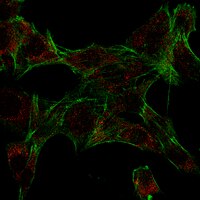An activating NLRC4 inflammasome mutation causes autoinflammation with recurrent macrophage activation syndrome.
Canna, SW; de Jesus, AA; Gouni, S; Brooks, SR; Marrero, B; Liu, Y; DiMattia, MA; Zaal, KJ; Sanchez, GA; Kim, H; Chapelle, D; Plass, N; Huang, Y; Villarino, AV; Biancotto, A; Fleisher, TA; Duncan, JA; O'Shea, JJ; Benseler, S; Grom, A; Deng, Z; Laxer, RM; Goldbach-Mansky, R
Nature genetics
46
1140-6
2014
Mostra il sommario
Inflammasomes are innate immune sensors that respond to pathogen- and damage-associated signals with caspase-1 activation, interleukin (IL)-1β and IL-18 secretion, and macrophage pyroptosis. The discovery that dominant gain-of-function mutations in NLRP3 cause the cryopyrin-associated periodic syndromes (CAPS) and trigger spontaneous inflammasome activation and IL-1β oversecretion led to successful treatment with IL-1-blocking agents. Herein we report a de novo missense mutation (c.1009A greater than T, encoding p.Thr337Ser) affecting the nucleotide-binding domain of the inflammasome component NLRC4 that causes early-onset recurrent fever flares and macrophage activation syndrome (MAS). Functional analyses demonstrated spontaneous inflammasome formation and production of the inflammasome-dependent cytokines IL-1β and IL-18, with the latter exceeding the levels seen in CAPS. The NLRC4 mutation caused constitutive caspase-1 cleavage in cells transduced with mutant NLRC4 and increased production of IL-18 in both patient-derived and mutant NLRC4-transduced macrophages. Thus, we describe a new monoallelic inflammasome defect that expands the monogenic autoinflammatory disease spectrum to include MAS and suggests new targets for therapy. | Western Blotting | 25217959
 |









